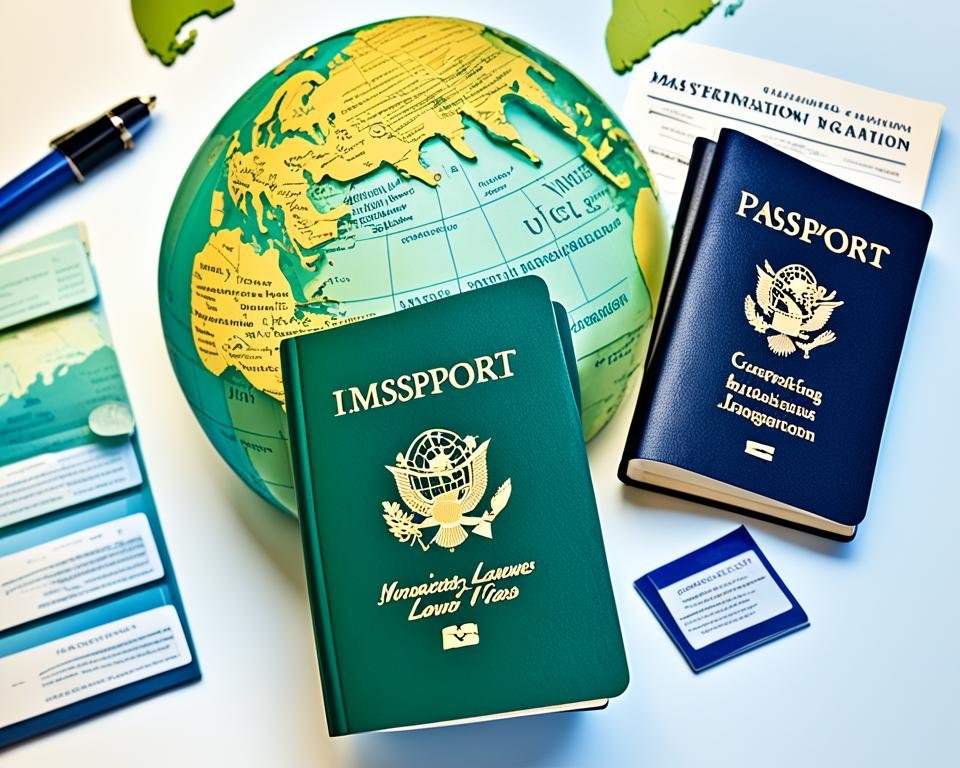As the world becomes increasingly interconnected, more and more individuals are seeking to navigate the complexities of immigration laws. Whether you are planning to study, work, reunite with family, or embark on a new life in a different country, understanding the intricacies of immigration regulations is crucial for a successful journey.
In this comprehensive guide, I will provide you with the essential information you need to master immigration laws. From the visa application process to citizenship requirements and permanent residency options, I will break down the steps and requirements for aspiring global citizens. Along the way, I will also cover the role of immigration attorneys, resources for staying updated with immigration policy changes, and everything you need to know about the US immigration process.
By the end of this guide, you will be equipped with the knowledge and resources to navigate the immigration process confidently and efficiently. Let’s dive in and start your journey towards mastering immigration laws!
Key Takeaways:
- Mastering immigration laws is essential for global citizens seeking to navigate the complexities of immigration regulations.
- This guide will provide comprehensive information on visa applications, citizenship requirements, permanent residency, and the US immigration process.
- Immigration attorneys play a vital role in providing legal assistance and guidance throughout the immigration process.
- Staying updated with immigration policy changes is crucial for successful immigration planning.
- Resources such as official government websites, non-profit organizations, and online forums can provide valuable support and information for individuals navigating immigration laws.
An Overview of Global Immigration Regulations
Immigration regulations play a significant role in shaping the movement of individuals across international borders. By understanding the global immigration laws and policies, individuals can navigate the complex process of immigration more effectively. This section provides an overview of immigration regulations, highlighting the various types of laws and policies implemented by countries worldwide.
Global immigration laws encompass a wide range of regulations governing international visa requirements and immigration policies. Each country has its own set of rules and criteria for individuals seeking to immigrate, with some countries offering more lenient processes and others imposing stricter requirements. It is crucial to familiarize oneself with the specific immigration regulations of the intended destination country.
The overview of immigration regulations presents several key concepts:
- International Visa Requirements: Different countries have distinct visa requirements for individuals wanting to visit, study, work, or reside within their borders. These requirements may involve specific documentation, financial evidence, health clearances, and character checks.
- Immigration Policies: Immigration policies refer to the principles and guidelines implemented by countries to regulate the inflow and outflow of foreign individuals. These policies can be influenced by factors such as national security, economic considerations, and demographic trends.
“Understanding the diverse range of immigration regulations is essential for individuals planning to relocate internationally. Each country has its own unique set of requirements and policies that need to be navigated successfully.”
By gaining an understanding of global immigration regulations, individuals can better prepare themselves for the challenges and opportunities that lie ahead. The following table provides an overview of immigration regulations in select countries, highlighting their visa requirements and immigration policies:
| Country | Visa Requirements | Immigration Policies |
|---|---|---|
| United States | Varies based on visa type (tourist, student, work, etc.) | Focus on skills-based immigration, offering diverse visa categories |
| Canada | Varies based on visa type (visitor, student, skilled worker, etc.) | Points-based system, prioritizing skilled immigrants for economic growth |
| Australia | Varies based on visa type (visitor, student, work, etc.) | Points-based system, emphasizes skilled migration to support the economy |
It is important to note that immigration regulations are subject to change, reflecting the evolving priorities and circumstances of each country. Staying informed about immigration policy updates is crucial to ensure accurate compliance with the latest requirements.
The next section will delve deeper into the visa application processes, providing insights on the various visa types, their specific requirements, and the steps involved in applying for a visa.
Understanding Visa Application Processes
When it comes to traveling abroad or relocating to a different country, understanding the visa application process is crucial. Navigating through the various visa types, requirements, and application steps can be overwhelming, but with the right knowledge, you can streamline the process and avoid common mistakes.
Types of Visas and Their Requirements
Visas come in various types, each serving different purposes and having unique eligibility criteria. Familiarizing yourself with the visa options available to you can help you determine the most suitable one for your needs. Here are some common types of visas and their requirements:
| Visa Type | Requirements |
|---|---|
| Student Visa | Acceptance to an accredited institution, proof of financial support, and a valid passport |
| Work Visa | Job offer from an employer, proof of qualifications and experience, and a valid passport |
| Tourist Visa | Valid travel itinerary, proof of accommodation, sufficient funds, and a valid passport |
| Business Visa | Invitation from a business entity, proof of business activities, and a valid passport |
It’s essential to carefully review the specific requirements for your desired visa type and ensure that you meet all the necessary criteria before proceeding with the application.
Steps for Applying for a Visa
The visa application process typically involves several steps, depending on the country and visa type. While the exact process can vary, here are the general steps you may need to follow:
- Gather all required documents: This includes your passport, application forms, supporting documents, and any additional paperwork specific to your visa type.
- Complete the application forms: Fill out the necessary forms accurately and provide all requested information.
- Pay the application fees: Some visa applications require a fee, which must be paid at the time of submission.
- Schedule an appointment: Depending on the visa requirements, you may need to schedule an appointment at a consulate or embassy for an interview or biometrics collection.
- Submit your application: Compile all the required documents and submit your application through the designated channel, whether it be online or in person.
- Wait for processing: The processing time can vary, so be prepared for potential delays. Monitor the status of your application regularly.
- Receive a decision: Once your visa application is processed, you will receive a decision regarding your application. If approved, follow the instructions provided to obtain your visa.
Remember to carefully follow the instructions provided by the immigration authorities and submit all required documents to increase your chances of a successful visa application.
Common Pitfalls and How to Avoid Them
During the visa application process, there are common mistakes that applicants often make, leading to delays or even rejections. By being aware of these pitfalls, you can take proactive steps to avoid them. Here are some common visa application mistakes and how to prevent them:
- Incomplete or inaccurate forms: Double-check all the information you provide on your application to ensure accuracy and completeness. Any errors can lead to delays or rejections.
- Insufficient supporting documents: Review the required supporting documents for your visa application and provide all necessary evidence. Failure to submit the correct documents can result in application denials.
- Missing deadlines: Pay attention to any application deadlines and ensure that you submit your materials on time. Late submissions may not be accepted.
- Ignoring visa requirements: Thoroughly understand and fulfill all the visa requirements to avoid unnecessary complications. Failure to meet specific criteria can lead to visa refusals.
- Lacking preparation for interviews: If an interview is part of the visa application process, adequately prepare by researching common interview questions and practicing your responses. Being unprepared can negatively impact your chances of approval.
By being aware of these common pitfalls and taking the necessary precautions, you can increase your chances of a successful visa application and avoid unnecessary setbacks.

Criteria for Achieving Citizenship in Various Countries
In order to become a citizen of another country, individuals must meet certain criteria and fulfill specific requirements. The process of obtaining citizenship, also known as naturalization, varies from country to country. Understanding the citizenship requirements, naturalization process, and other considerations is crucial for those seeking to become citizens of a different nation.
One aspect to consider is dual citizenship, which refers to individuals holding citizenship in two different countries simultaneously. Some countries allow dual citizenship, while others have restrictions or prohibit it altogether. It is important to research and understand the policies regarding dual citizenship in the countries of interest.
Another option for acquiring citizenship is through descent or ancestry. Citizenship by descent allows individuals who have at least one parent or grandparent with citizenship in a particular country to claim citizenship themselves. This can be advantageous for those wanting to reconnect with their heritage or take advantage of the benefits that come with citizenship.
When applying for citizenship, individuals must typically meet certain requirements, including residency duration, language proficiency, knowledge of the country’s history and culture, and a clean criminal record. It is essential to familiarize oneself with these requirements and ensure that all eligibility criteria are met.
The naturalization process usually involves submitting an application, providing supporting documents, undergoing interviews, and possibly taking tests. The specific steps may vary, but overall, the process is designed to assess an individual’s commitment to the country and their ability to integrate into its society.
It is crucial to consult the official government websites or consult an immigration attorney for accurate and up-to-date information on the citizenship requirements and naturalization process of the desired country. This will help ensure a smooth and successful journey towards acquiring citizenship.
Navigating Immigration Laws
When it comes to immigration, staying informed and understanding the ever-changing landscape of immigration laws is crucial. Navigating immigration laws can be complex and challenging, requiring individuals to keep up with updates, interpret policy guidance, and seek legal assistance when needed. In this section, I will provide guidance on how to effectively navigate immigration laws, including staying up-to-date with US immigration updates, understanding immigration policy guidance, and accessing legal immigration assistance.
Keeping Up with US Immigration Updates
US immigration updates and changes occur regularly, and staying informed about these updates is essential. To keep up with US immigration updates, individuals can:
- Subscribe to official government websites to receive notifications and alerts regarding immigration policy changes.
- Follow reputable news sources and immigration law blogs that provide regular updates on changes to immigration laws and regulations.
- Utilize online forums and communities where individuals share information and experiences related to recent immigration updates.
By staying informed about US immigration updates, individuals can proactively adjust their plans and strategies accordingly to ensure compliance with the latest regulations.
Interpreting Immigration Policy Guidance
Interpreting immigration policy guidance is crucial to understanding the implications of immigration regulations. Here are some tips on effectively interpreting immigration policy guidance:
- Read policy memos and guidance documents provided by immigration authorities to gain a thorough understanding of their intent and application.
- Consult with immigration law experts and attorneys who are well-versed in interpreting policy guidance and can provide guidance based on their expertise.
- Access online resources and FAQs provided by official government websites to clarify any doubts or questions related to specific immigration policies.
By interpreting immigration policy guidance accurately, individuals can navigate the immigration process more confidently and make informed decisions regarding their immigration status.
Seeking Legal Immigration Assistance
When dealing with complex immigration laws, seeking legal immigration assistance is highly recommended. Immigration attorneys can provide valuable guidance and support throughout the immigration process. Here are some reasons why individuals may consider seeking legal immigration assistance:
- Immigration attorneys can assess eligibility for various immigration options and provide personalized advice based on an individual’s circumstances.
- They can assist with completing immigration forms accurately and efficiently, ensuring compliance with relevant requirements.
- Immigration attorneys can represent individuals in legal proceedings, such as immigration court hearings or appeals.
- They can offer guidance on strategizing and navigating the immigration process, increasing the chances of a successful outcome.
When seeking legal immigration assistance, individuals should choose an immigration attorney who is experienced, knowledgeable, and has a track record of success. Consulting with an immigration attorney can help individuals navigate the complexities of immigration laws and ensure they are well-represented throughout their immigration journey.

In summary, navigating immigration laws requires individuals to stay updated with US immigration updates, interpret immigration policy guidance accurately, and seek legal immigration assistance when needed. By following these guidelines, individuals can navigate the complex immigration process with confidence and increase their chances of achieving their immigration goals.
Securing Permanent Residency: Guidelines and Laws
In this section, I will provide valuable information about securing permanent residency in various countries, with a specific focus on the green card process in the United States. Understanding the guidelines and laws related to permanent residency is crucial for individuals seeking to establish long-term residency in a foreign country.
Permanent residency laws vary from country to country, and it is important to be aware of the specific requirements and eligibility criteria. In the United States, the green card process is the primary pathway to permanent residency. To become eligible for a green card, individuals must meet certain qualifications, such as family ties, employment opportunities, or humanitarian reasons.
The green card application process involves submitting a detailed application, supporting documents, and paying the necessary fees. It is essential to carefully follow the instructions and requirements outlined by the United States Citizenship and Immigration Services (USCIS) to ensure a smooth and successful application process.
Gaining permanent residency rights and benefits is a significant milestone for individuals looking to establish roots in a foreign country. Permanent residents enjoy various rights and benefits, including the ability to live and work permanently in the country, access to healthcare and social services, educational opportunities, and protection under the country’s laws.
| Permanent Residency Rights and Benefits |
|---|
| Ability to live and work permanently in the country |
| Access to healthcare and social services |
| Educational opportunities |
| Protection under the country’s laws |
Securing permanent residency is a significant achievement that provides individuals with stability, security, and opportunities in their adopted country. It is crucial to familiarize oneself with the permanent residency laws and processes specific to the country of interest to navigate the application process effectively.
The Role of Immigration Attorneys in Your Application Process
An immigration attorney plays a crucial role in helping individuals navigate the complex immigration application process. Whether you are applying for a visa, seeking legal advice, or dealing with immigration-related issues, consulting with an experienced immigration attorney can provide you with the guidance and support you need to achieve a successful outcome.
When to Consult an Immigration Attorney
While some immigration applications may seem straightforward, there are certain situations where consulting an immigration attorney is highly recommended. Consider seeking legal advice from an immigration attorney in the following scenarios:
- When your case is complex or involves unique circumstances
- If you have been denied a visa or faced previous immigration issues
- When you are unsure about the eligibility requirements or documentation needed
- If you are facing deportation proceedings or removal orders
- When you need to appeal a decision made by immigration authorities
Services Provided by Immigration Lawyers
Immigration attorneys offer a wide range of services to assist individuals with their immigration needs. Some of the key services provided by immigration lawyers include:
- Providing legal advice and guidance on immigration matters
- Assisting with the preparation and submission of immigration applications
- Reviewing and analyzing immigration documents for accuracy and completeness
- Representing clients in immigration court proceedings
- Appealing adverse decisions by immigration authorities
- Negotiating with immigration officials on behalf of clients
How to Choose the Right Immigration Attorney
Choosing the right immigration attorney is crucial to ensuring a smooth and successful application process. Consider the following factors when selecting an immigration attorney:
- Experience and expertise in immigration law
- Positive reviews and client testimonials
- Availability and responsiveness
- Fee structure and affordability
- Good communication skills and cultural sensitivity
- Understanding of your specific immigration needs and goals
By carefully considering these factors and conducting thorough research, you can find an immigration attorney who is well-qualified and can provide the support you need throughout your immigration journey.

| Services Provided by Immigration Lawyers | Benefits |
|---|---|
| Legal advice and guidance on immigration matters | Receive expert advice tailored to your specific situation |
| Assistance with the preparation and submission of immigration applications | Ensure accurate and complete documentation |
| Representation in immigration court proceedings | Have an experienced advocate on your side |
| Appealing adverse decisions by immigration authorities | Fight for your rights and overturn unfavorable decisions |
Comprehensive Guide to US Immigration Process
Understanding the US immigration process is essential for individuals seeking to live, work, or study in the United States. This comprehensive guide will provide you with a step-by-step overview of the various stages involved, from applying for a visa to adjusting your status and ultimately becoming a US citizen.
Step 1: US Visa Requirements
To begin the immigration process, you will first need to determine the specific US visa requirements that apply to your situation. The United States offers various visa categories, including tourist visas, student visas, work visas, and family-based visas. Each visa type has its own eligibility criteria, documentation requirements, and application process.
Step 2: Applying for a Visa
Once you have identified the appropriate visa category, you can proceed with the visa application process. This typically involves completing the relevant forms, submitting supporting documents, paying the necessary fees, and attending an interview at the US embassy or consulate in your home country. It is important to carefully follow the instructions provided and ensure that all documentation is accurate and up to date.
Step 3: Adjusting Status
If you are already in the United States on a non-immigrant visa and wish to change your status to become a permanent resident, you may be eligible to adjust your status. This process involves filing an application with the United States Citizenship and Immigration Services (USCIS). The requirements for adjusting status can vary depending on the specific visa category you hold and your individual circumstances.
Step 4: US Citizenship Application
Once you have obtained permanent residency, you may choose to pursue US citizenship. The US citizenship application process, also known as naturalization, requires meeting specific eligibility criteria, completing the N-400 application form, attending an interview, and passing the naturalization test. It is important to carefully review the requirements and prepare thoroughly for the naturalization process.
By following these steps and understanding the US immigration process, you can navigate the complexities and successfully achieve your immigration goals in the United States.
Resources for Decoding Immigration Law Complexities
Understanding and navigating immigration laws can be a complex and challenging process. Fortunately, there are various resources available to help individuals seeking to unravel the intricacies of immigration law. Whether you’re looking for official immigration websites, non-profit organizations that support immigrants, or online forums where you can seek advice and guidance, these resources can provide valuable information and assistance.
Official Immigration Resources and Government Websites
Official immigration resources and government websites are reliable sources of information on immigration laws and regulations. These websites provide up-to-date information on visa requirements, eligibility criteria, immigration policies, and application processes. The information provided on these sites is often accurate, trustworthy, and comprehensive, making them essential references for individuals navigating the immigration process.
Some recommended official immigration resources and government websites include:
- U.S. Citizenship and Immigration Services (USCIS)
- U.S. Department of State – Bureau of Consular Affairs
- Immigration, Refugees and Citizenship Canada
- UK Visas and Immigration
Non-Profit Organizations Supporting Immigrants
Non-profit organizations play a vital role in supporting and advocating for immigrants. These organizations provide invaluable resources, services, and assistance throughout the immigration process. They offer legal advice, counseling, educational programs, and community support for individuals facing immigration challenges.
Here are some non-profit organizations that are dedicated to supporting immigrants:
- National Immigration Law Center (NILC)
- Immigration Advocates Network
- Immigration Equality
- Catholic Charities
Online Forums and Community Support
Online forums and community support groups provide a platform for individuals to connect, share experiences, and seek guidance from others who have gone through similar immigration processes. These forums allow you to ask questions, gather insights, and receive support from a community of people who understand the challenges and complexities of immigration.
Here are some online immigration forums and communities worth exploring:
- Immigration Boards
- Visa Journey
- Immihelp Forum
- Rajiv S. Khanna’s Immigration Law Forums
By utilizing these resources, you can acquire knowledge, access support, and find guidance to help you navigate the complexities of immigration law. Remember that each immigration case is unique, and it is always advisable to consult with immigration attorneys and professionals for personalized advice and assistance.
Key Updates in Immigration Policies You Should Know
In today’s rapidly changing political landscape, staying updated with recent changes in immigration laws is crucial for individuals navigating the complex immigration process. The impact of policy changes on immigrants cannot be understated, and being aware of these updates can help individuals make informed decisions about their immigration journey.
Recent years have seen significant shifts in immigration policies, particularly in countries like the United States. It is important for immigrants and aspiring immigrants to stay informed about these policy changes to ensure they comply with the latest requirements and understand how they might be affected.
“The only constant in the world of immigration is change.”
As an immigrant, you need to be aware of changes in laws related to visa applications, citizenship requirements, and permanent residency. Regularly checking for updates from official government sources and reputable news outlets can help keep you informed about recent developments in immigration policies.
In addition to government websites, there are several reliable resources available to help you stay up to date:
- Legal immigration assistance services
- Online forums and communities
- Immigration advocacy organizations
Engaging with these resources can provide valuable insights and guidance, enabling you to understand the impact of policy changes and make informed decisions about your immigration journey.
By staying informed about immigration policy updates and recent changes in immigration laws, you can both protect yourself from legal issues and take advantage of new opportunities. Knowledge is power when it comes to navigating the complexities of immigration, and staying updated is an essential step in mastering immigration laws.
Conclusion
Mastering immigration laws is an essential guide for global citizens navigating the complex world of immigration regulations. Throughout this comprehensive guide, we have explored the various aspects of the immigration process, from understanding visa application processes to achieving citizenship in different countries. By providing valuable information and resources, our aim has been to equip individuals with the knowledge they need to successfully navigate the immigration journey.
As global citizens, it is crucial to stay informed about immigration regulations and policy updates. The landscape of immigration laws is constantly evolving, and it is important to be aware of any changes that may impact your immigration status. By staying up to date with immigration policy guidance and seeking legal immigration assistance when needed, individuals can navigate the process more effectively.
Remember, this guide is designed to provide a comprehensive overview of immigration laws. However, it is always advisable to consult with immigration attorneys who specialize in immigration law. They can provide personalized advice and support, ensuring that your specific immigration needs are addressed.
In conclusion, mastering immigration laws is an essential guide for global citizens. By understanding the immigration regulations and navigating the process with proper knowledge and assistance, individuals can increase their chances of a successful outcome. We hope that this guide has provided valuable insights and resources to help you in your immigration journey. Good luck as you embark on this important process!









